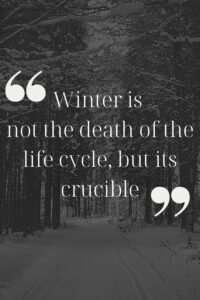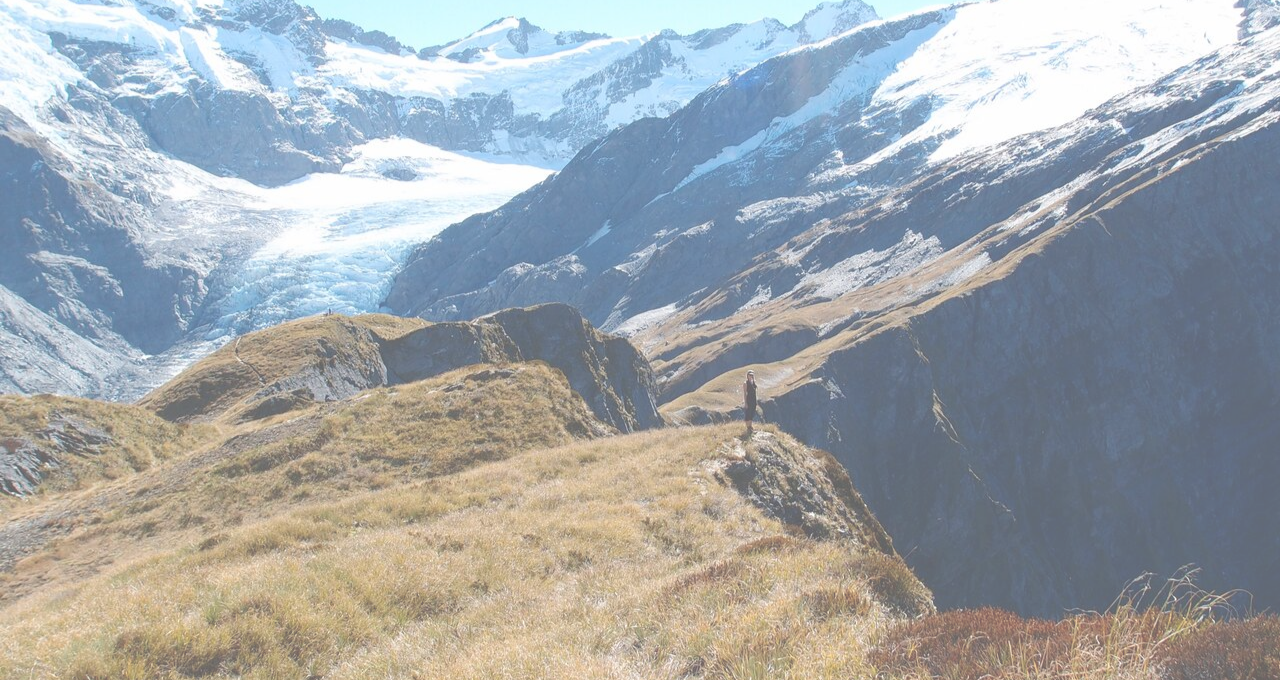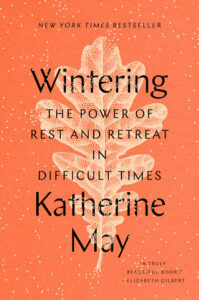Wintering: The Power of Rest and Retreat in Difficult Times by Katherine May
As the English writer Katherine May illuminates in her beautiful, meditative book, wintering is at once a season of the natural world, a respite our bodies require, and a state of mind. Katherine May is an English writer and author of several fiction and non-fiction books. She is a writing coach and also hosts a podcast called Wintering Sessions. She lives in Whitstable, UK with her husband, son, three cats, and a dog. She is a self-proclaimed lover of the cold and a survivor of several personal winters, from which she has emerged stronger and wiser.
I came to know of Katherine May and her book Wintering from my favorite podcast On Being with Krista Tippett. When I heard May speak of the seasons and rhythms of life as wintering, it really spoke to me because I felt this was the exact thing I was experiencing in my life (not to mention the pandemic and the collective ‘winter’ we were all facing). She explained her use of the term winter as a metaphor for “those phases in our life when we feel frozen out or unable to make the next step, that can come at any time, in any season, in any weather,” and have nothing to do with the physical cold. This was exactly what I was experiencing; a season of life that was cold and dark, but just that, a season, and seasons end. Her interview was incredible. I went out and bought the book on my kindle immediately and wish to outline it here for you because it really touched home in a way that I think many of us can relate to in this pandemic season.
What is Wintering?
What exactly is wintering? May describes it as a “season in the cold… a fallow period in life where you are cut off from the world, feeling rejected, sidelined, blocked from progress, or cast into the role of outsider.” Wintering can come upon us suddenly in the form of a major life event or it can slowly creep up on us through the slow transitions of life. It is often lonely, involuntary, and painful, but it is inevitable. As May points out, we like to think it is possible for life to be one eternal summer with everything as it should be, never experiencing negative emotions or experiences. And then when we do have such experiences, or winterings, which are an inevitable part of life, we then believe we have somehow failed.
This is unrealistic. Just as the earth must succumb to the changing seasons, so to must all that live on it, even us. May’s advice is to listen to these seasons. These winters ask something of us, and we must invite them in so we can learn and grow. “It’s a time for reflection and recuperation, for slow replenishment, for putting your house in order. Doing these deeply unfashionable things — slowing down, letting your spare time expand, getting enough sleep, resting — is a radical act now, but it’s essential.”
What it Looked Like for Her
In the book May outlines wintering from her own personal experience of a particularly hard winter in her life. A winter that started on a sunny day in late August, first with her husband being hospitalized for appendicitis, and then her own illness forcing her to stop, which plunged her into a winter that would change her outlook on life.
She combines her research into wintering with her own experience of a winter in her life by framing the book as chapters dedicated to the months and phases of winter. For her it was a season of slowing down. No work, her son was out of school for other reasons, just slow, deliberate time to read and think. To bake and work with her hands. To commune with the cold and the sadness. She explored not only the seasons and cycles of the natural world, but the rituals, ideas, and celebrations in folklore and ancient cultures around winter. She began to really notice the progress of light across the year; the way the sun moves across the sky, how long we spend in darkness and in cold, and how we find hope at the deepest part of the cold season.

What Wintering Looked Like for Me
May’s winter began because she had spent the last few years running on overwhelm and boy, do I relate to that. I think so many of us women can. The hustle of life and family and work, keeping all the balls in the air, not recognizing our body and mind and soul’s need for rest.
I wrote elsewhere about my ‘summer of radical self-love’; how I had planned on taking the last few months of my pregnancy to get some ‘me’ time, how instead it turned into a falling apart and a deep look into how I was structuring my life and how I needed to change it. This, I now realize, was not a fun experiment in self-love, but a winter. I really recognized my own struggles in the ways she described being forced to stop, go inward, slow down, and seek replenishment for survival, instead of the ‘self-care,’ spas, and fun I had envisioned for my ‘summer of self-love.’ More survival than luxury.
It took a medical diagnosis to legitimate May’s overwhelm and allow her to actually stop. She was ordered to rest, recuperate, and take care of herself. This is always hard, I think, as a woman and a mother to listen to your body and take care of your own needs first. In the book she mentions feeling guilty over enjoying her slow, quiet healing time because she felt worried about the burden she had placed on her colleagues at work.
In my own winter I experienced this guilt as well. My body literally forced me to lay down and rest, and when I could hear my husband and daughter playing in the other room I would cry hot tears of guilt and shame for not being able to participate; for having to check out and retreat to my bedroom and not help, play, live with my family for a time. Just as May had to feel validated to enter her winter by being declared officially ill by a doctor, so too did I need the permission to stop: admitting I had depression.
I had planned to spend time in solitude, reflecting and enjoying my favorite activities. Energizing and motivating me for my new role as a mother of two. But instead, I fell apart. I could not move some days. I had to lay in bed and rest and cry and wallow in my inability to preform ‘proper’ self-care. I had to take a long hard look at myself, my life, and what I valued versus how I actually lived my life. What I found was that the values I espoused were not in line with the reality of my day-to-day life. That realization brought me to a very low, but necessary place, because it resulted in an unraveling and then a slow rebuilding of myself. Now, after reading Wintering, I understand this was an essential season in my life. May says winter is not the death of the life cycle, but it’s crucible. In order to rebuild myself I had to let go, surrender, and admit I needed help.
Once I acknowledged the reality of my situation, I was able to truly care for myself in a way that was necessary and radical for me. I stopped all activity: all planning, managing, controlling, striving. I spent most of my time looking inward and asking, “at this moment, what is it I am feeling right now? And what is it that I need right now?” Then I did the really hard work of asking for it; creating boundaries with my husband and daughter so I could have what I needed. I also had to redefine success. As a doer and a get-shit-done kind of person, doing nothing felt akin to failure. But what I had to learn was that my real values in life, the things that really add fulfillment and joy to my life, are not fast, productive accomplishments, but presence and connection. When I am truly in a state of flow, I am present and connected to my surroundings. So, I redefined success. I realized that if my core values are presence and connection, then spending time immersed in a book, coloring with my daughter, or cuddled up on the couch were all just as worthy (if not more worthy) endeavors than organizing, planning, and hustling. And they sure brought me more joy and peace.
What I Learned from Wintering
- How to be present.
- How to slow down.
- Love and self-compassion.
- Seasons are normal.
- We need up and downs.
- There is nothing wrong with me
I ended up spending my ‘summer of radical self-love’ wintering. I slowed down, got cozy, got present. I was very intentional about my actions and choices. Very slow and deliberate. I realized that my need to hustle and succeed was just a coping mechanism to deal with unwelcome feelings of sadness, fear, shame, and guilt. Once I slowed down, I had to confront those feelings. And you know what I learned? They’re not so bad. I can feel them. I can be with them for a minute and not just suffer, but learn. As May says, these winters that we each experience are asking something of us. And we need to stop and listen. I love this quote from the book:
“I’m beginning to think that unhappiness is one of the simple things in life: a pure, basic emotion to be respected, if not savored. I’d never dream of suggesting that we should wallow in misery or shrink from doing everything we can to alleviate it, but I do think it’s instructive. After all, unhappiness has a function: it tells us that something is going wrong. There will be moments when we’re riding high and moments when we can’t bear to get out of bed. Both are normal. Both in fact require a little perspective.”
Conclusion

Wintering is understanding that being a human is to live a life that’s deeply cyclical. There is no eternal summer or final destination that will end in us ‘arriving’ with no pain or discomfort. There is no perfect life. Life is fundamentally cyclical; everything repeats itself and nothing lasts. If we can truly grasp and believe in how fleeting this life is, how delicate, how subject to powers beyond our control, then we can begin to set our minds to a better way of living within it.



